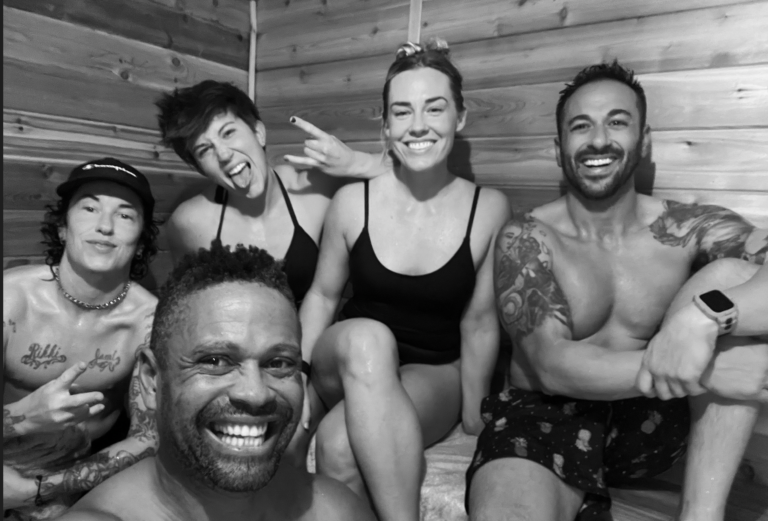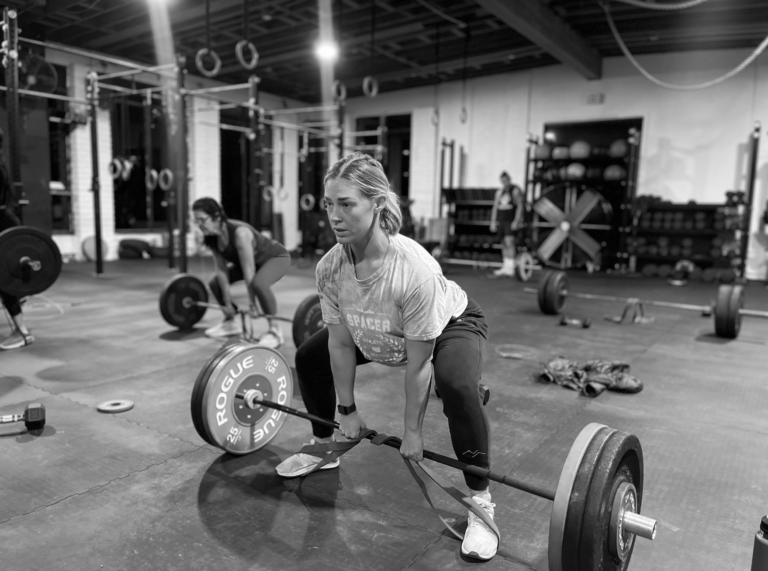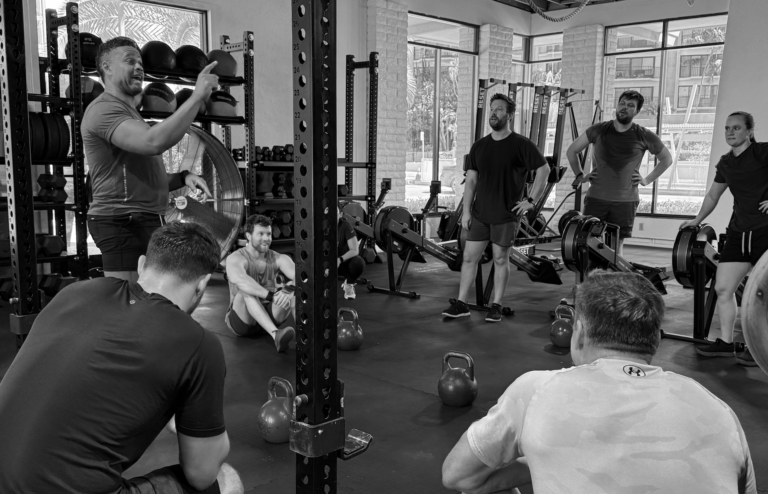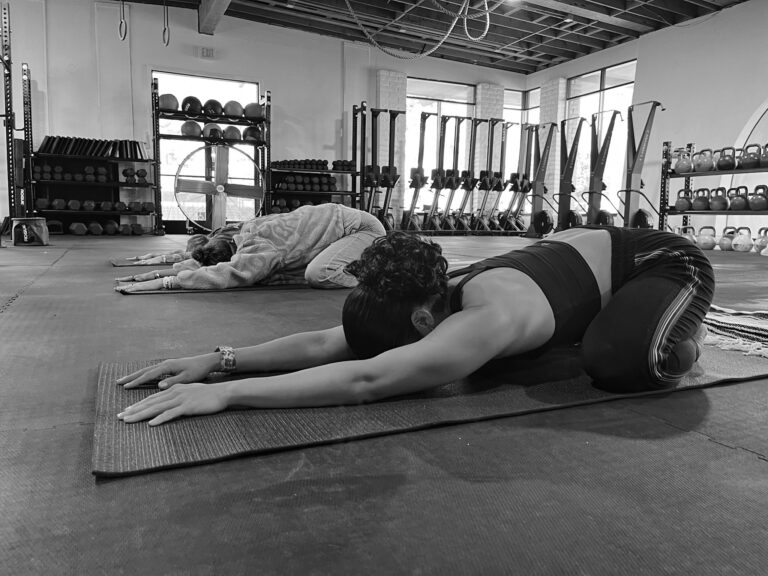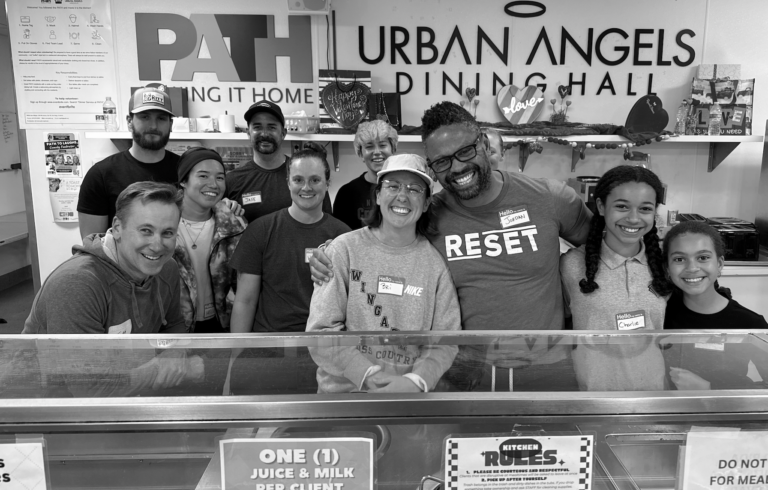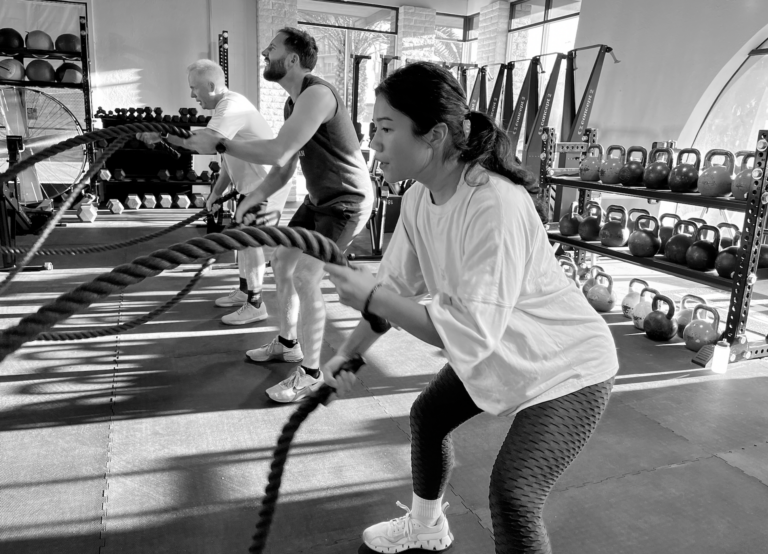Walking into a gym for the first time can be terrifying, no matter who you are or how you identify. Maybe you haven’t exercised in years, or you’re recovering from an injury, or you just had a baby. Or perhaps you’re in pretty good shape physically, but a room full of heavy barbells and rowing machines makes your heart pound in a different way. At RESET, we’ve seen time and again that pushing yourself is much more manageable—and significantly more rewarding—when you’re part of a community that embraces you fully, wherever you’re at.
This post is about two things we hold dear: doing hard things and fostering an inclusive space. Doing hard things looks different for everyone. It could mean lifting weights you never thought possible, working at a pace that makes you a little queasy, or trying to stay centered in a scorching sauna. It might also mean simply stepping through the doors of a gym for the very first time—or for the first time in years. Regardless of your starting line, the challenge feels less intimidating and more meaningful when you know you’re not alone.
Hard Things: A Spectrum of Challenges
“Hard” is personal. What feels like a manageable workout for someone might be a life-altering milestone for someone else. Angela Duckworth, who we adore for her work and writing on grit, emphasizes that perseverance thrives when we have purpose and a supportive environment. That’s one reason our inclusive community matters so deeply: it helps you persist.
Let’s get physical
Some of us find our thrill in tackling heavy weights—striving for personal records in olympic lifts, or absolutely crushing through a grueling metcon. Others prefer a long run or a sprint session that tests every fiber of our being. Regardless of your chosen path, physically strenuous tasks often become tangible symbols of progress. There’s a something ineffable, and surprisingly emotional, about nailing your first pull-up or shaving precious seconds off your mile run.
Not everyone resonates with big deadlifts or echo bike sprints—and that’s okay. Doing “hard things” could mean venturing outside your usual comfort zone in many ways, such as adding an extra mobility routine to improve your flexibility, or conquering your fear of the cold plunge. Remember that physically demanding tasks come in many forms, from short bursts of intensity to enduring mental marathons.
But it is also a mental game
Hard things also loom large in the mental realm: performance anxiety, intimidation, and the nagging voice that says, “I can’t do this.” Sometimes showing up is the hardest part. If you’ve ever hesitated outside the gym doors, worried about judgment or your own capabilities, know that countless others have been right there with you.
Entering a new environment, especially if you feel you don’t fit the “typical” image of a gym-goer, can stir up fears of not belonging. But as Brene Brown might say, the courage to show up wholeheartedly—to risk failure or embarrassment—fosters authentic growth. In a supportive community, that risk diminishes, and the potential for transformation skyrockets.
Post-Baby, Post-Injury, or Post-Giving a Sh!#
For some, returning to a gym after having a baby presents a unique set of emotional and logistical hurdles. Balancing childcare, healing bodies, and shifting schedules can make even a 30-minute workout feel gargantuan. Others might be dealing with an injury or a long gap in their exercise history. The question “Do I still belong in a fitness space?” echoes in the mind. The short answer: Absolutely.
At RESET, we believe that every stage of life—and every phase of fitness—merits respect and tailored support. Whether your “hard thing” is benching your bodyweight or venturing back into a group class after months away, you deserve a place that celebrates your effort.
The Power of Inclusive Community
A community isn’t just a collection of people; it’s a network of trust, support, and shared purpose. James Clear notes that our habits often mirror those of the groups we identify with. That means if you join a community that consistently shows up, pushes limits, and welcomes everyone, you’ll likely adopt those behaviors, too.
Embracing Differences
At RESET, inclusivity isn’t a marketing buzzword. We mean it when we say everyone is welcome—regardless of body size, experience level, or background. That might mean offering multiple scaling options for a workout, adjusting the environment to be more accessible, or simply greeting new faces with a warm hello. We use barbells and pronouns. We think everyone deserves an opportunity to find their best self on their fitness and wellness journey. And they deserve to get a couple of hugs and high fives along the way from people fighting their own battles right beside them. We’ve seen powerful bonds form among people who, on the surface, seemed to have nothing in common—except the desire to better themselves. Creating such a space demands ongoing effort, from language that respects everyone’s pronouns to event planning that accommodates diverse needs. The result, however, is a gym culture where no one feels out of place, and everyone has a shot at meaningful progress, physically or otherwise.
The Confidence Factor
When you watch others attempt challenging tasks—whether it’s a heavy squat, a timed workout, or a 10-minute sauna session—you realize you can try them, too. Each person who dares to do something tough paves the way for someone else to believe it’s possible.
In a 2021 study from the European Journal of Sport Science, participants reported higher self-efficacy (the belief in their capability to succeed) when they trained in groups rather than alone. This effect was even stronger in supportive, inclusive environments. Sometimes all it takes is a fellow member cheering you on—“Come on, you got this!”—to find that extra rep or stay in the sauna for that extra minute.
Shared Victories
One of the joys of community is celebrating milestones together. Maybe you’ve just deadlifted a personal best or found the courage to do a workout in a group setting despite anxiety. When the group collectively acknowledges your effort, your triumph feels bigger and more significant. And that sense of shared success builds loyalty and camaraderie, making you want to show up again.
Doing Hard Things: An Expanding Definition
Often, when people hear “do something hard,” they picture hyper-athletic feats—like sprinting a 100-meter dash in record time or lifting double their bodyweight. In reality, “hard” covers a wide spectrum. It might be pushing your speed in a short workout, but it could just as well be plucking up the courage to step through the gym door for the first time. If you’re postpartum, “hard” could be discovering how to reconnect with your changing body. If you’re an older adult, it might be bravely tackling movements you’ve avoided for years.
So how do we decide what’s “hard enough”? The answer lies in self-assessment. Check in with your own boundaries and discomfort levels. As Angela Duckworth’s research on grit suggests, we need to pick challenges that stretch us but aren’t so out of reach that they become demoralizing. Aim for goals that scare you just a little bit, but remain within the realm of doable.
Heat/Cold Exposure and Other Non-Traditional Challenges
Take sauna sessions, for instance. Many people equate “working hard” with reps and sets, forgetting the mental toughness required to endure high heat or cold plunges. A blazing sauna at 200°F isn’t just physically taxing— it challenges your mental resilience as well. For some, stepping into that oven of a sauna for even 5 minutes might feel like an Everest climb. Yet once you adapt, you might find yourself pushing for 10, 15, or 20 minutes, discovering newfound limits of endurance. The first time you step into sub 50 degree water you might panic but as you learned to harness your breath and calm your mind you will be surprised at your resilience.
RESET fosters these experiences because we see the broader payoff. By challenging your comfort zone—physically, mentally, or both—you build a type of resilience that carries over to the rest of life. If you can survive the sauna’s heat or take on a tough workout, you’ll likely handle life’s curveballs with a bit more grace.
Barriers to Doing Hard Things (And How Community Helps)
- Fear of Judgment: If you think everyone in the gym is silently critiquing your form or your fitness level, stepping onto the floor can be paralyzing. In a truly inclusive community, however, empathy replaces judgment. We all remember our first day, and we want to make sure no one feels like an outsider.
- Negative Self-Talk: The inner critic can drown out your willpower. “I’m too old,” “I’m too out of shape,” or “This just isn’t for me.” Encouragement from peers often silences those voices. Someone else’s belief in you can spark just enough momentum to try.
- Practical Obstacles: Childcare, busy work schedules, or lack of familiarity with equipment can derail even the best intentions. A community can offer support in ways that can help even the most harried individual find success. You aren’t in this alone. At RESET, we strive to offer varied class times and approachable equipment instruction, so these hurdles become stepping stones rather than full-stop barriers.
How RESET Cultivates Inclusivity for Hard Things
Coaching that Adapts
Our coaches don’t assume everyone can (or wants to) do the same routine. They offer modifications or progressions, whether you’re dealing with a past knee injury or you’re brand-new to the workout scene. This adaptability helps each member face a version of “hard” that challenges them without overwhelming them.
Language of Encouragement
“Good job!” might seem trivial, but in the midst of a grueling set or that final minutes of a tough workout, hearing genuine positivity can be transformative. Community members often develop a kind of group synergy—when one person lifts heavier or tries a new movement, everyone else cheers. Over time, these collective “wins” redefine what each individual considers possible.
Social Bonding Outside the Gym
We know that camaraderie deepens when you share experiences beyond the sweat. Group outings, potluck events, or volunteer initiatives can further unify members. When you’re comfortable with people off the gym floor, tackling hard things alongside them in a workout feels more like an adventure than an obligation.
Why Community + Hard Things = Growth
When you combine “hard things” with an inclusive, uplifting environment, you create a powerful formula for growth:
- Shared Struggle: Tackling challenges together fosters empathy and mutual respect. You see that the person next to you might also be fighting self-doubt, so you root for each other.
- Diverse Perspectives: Inclusivity means people bring varied backgrounds, skill levels, and stories to the table. That diversity enriches everyone’s experience, offering fresh ways of tackling the same challenge.
- Sustainable Motivation: If you attempt difficult goals alone, sustaining that motivation can be tough. A community can refill your emotional “tank” when you’re running on empty.
In essence, you’re building not just your personal grit but a collective resilience. Angela Duckworth’s concept of “grit” thrives best when your environment supports it. The synergy of acceptance, encouragement, and shared adversity can turn monumental obstacles into stepping stones.
Bridging the Gap to Real-Life Benefits
Doing hard things in an inclusive community isn’t just about bragging rights or notching new personal records. It bleeds into everyday life:
- Resilience at Work: If you can push through the fear of lifting a heavy barbell or endure a scorching sauna for 10 minutes, a tough deadline or a challenging meeting may feel more surmountable.
- Confidence in Social Settings: Knowing you can walk into a gym after a long break, or adapt a workout to your physical constraints, rewires your sense of capability. You might become more willing to try new hobbies or experiences outside the gym.
- Improved Mental Health: Movement releases endorphins, and shared movement fosters connection—two powerful antidotes to stress, anxiety, or mild depression.
- Sustained Inclusivity: When you experience acceptance in a fitness setting, you may be more inclined to extend that inclusivity in other areas—like your workplace or your circle of friends.
The Next Step: Embrace Your Version of “Hard”
We want to leave you with a challenge: identify one “hard thing” you’ve been avoiding. Maybe it’s trying that overhead squat you’ve been dreading, or summoning the nerve to join a group workout class. Or perhaps it’s coming back to the gym after a long hiatus, baby in tow, and telling yourself, “I deserve a spot here.”
Then take that challenge and share it. Talk to a coach, confide in a friend, or post about it in our community forum if you’re part of RESET. By naming the challenge and inviting others to be part of your journey, you link your own grit to the power of communal support. When you cross that threshold—be it five more pounds on the bar, an extra minute in the sauna, or simply stepping back into the gym after years away—you’ll realize how crucial community is for turning an intimidating task into a doable mission.
Final Thoughts
Doing hard things in an inclusive community isn’t just about fitness milestones; it’s about self-discovery, personal growth, and the unshakeable belief that you matter enough to challenge yourself. Everyone’s “hard” is unique, and each step forward deserves celebration. If the thought of lifting a heavy barbell or walking into a new gym makes your stomach churn, know that you’re not alone—and your fear doesn’t mean you’re incapable.
At RESET, we’ve seen transformations fueled by collective encouragement. Whether you’re postpartum, brand-new to exercise, or a seasoned athlete aiming for the next challenge, our mission is to offer a welcoming space to test your limits. We can’t promise you won’t sweat or occasionally doubt yourself, but we can promise you won’t have to do any of it alone.
So embrace the burn of that difficult workout, the blast of hot air in the sauna, or the emotional hurdle of re-entering a fitness space. “Hard things” become catalysts for growth when you share them with a group that believes in your potential. By redefining what’s possible—together—we learn that our capabilities often surpass what we dared to imagine.

